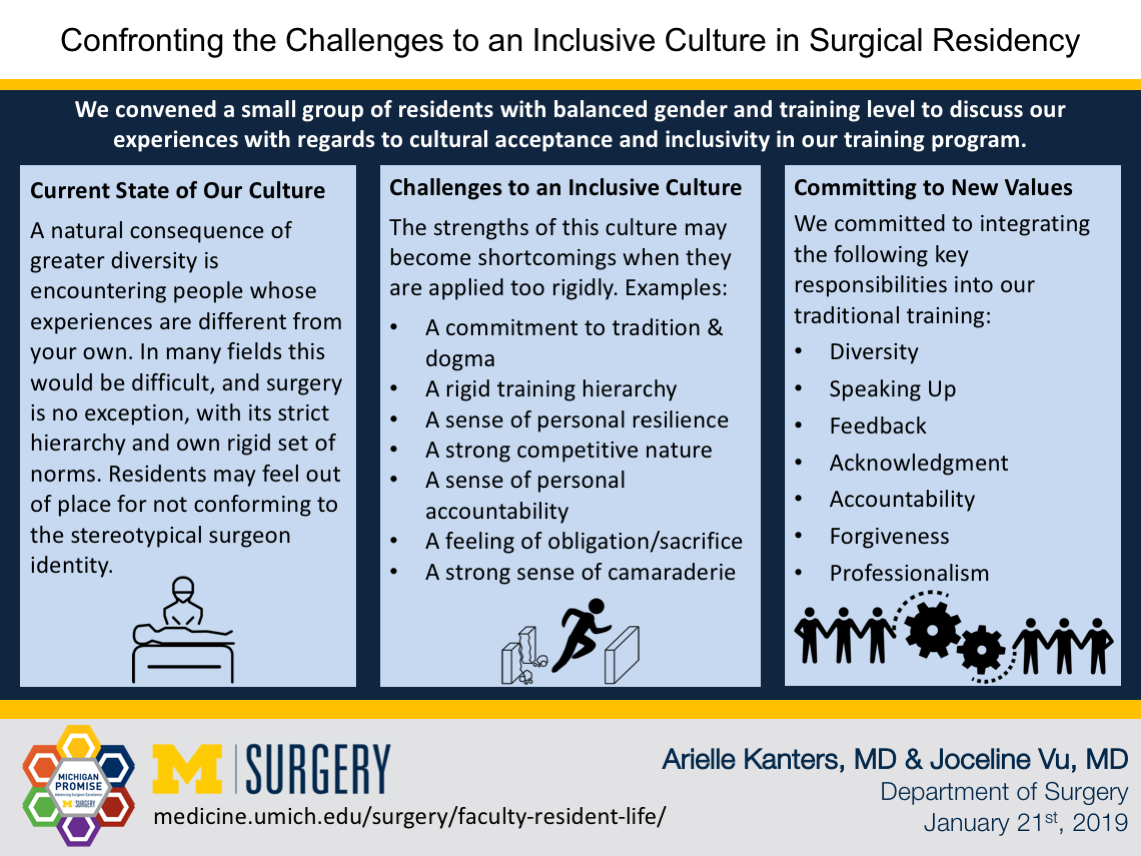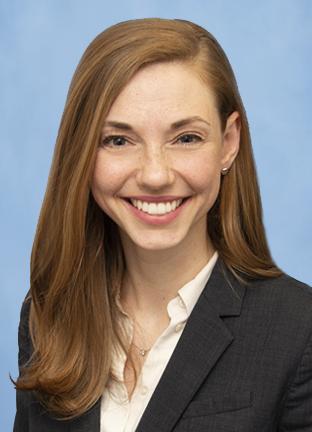

If we were to look at images of past surgical leaders, we would find a not-so-surprising lack of heterogeneity. Within the past few years, however, this has begun to change. There is rising interest in fostering diversity and inclusion in surgical culture. This change has been driven not only by numerous studies demonstrating the benefits of diversity, but also by the fact that the field of surgery is no longer accurately reflected by a single identity.
This change, however, has come with its own growing pains. Our demographics are changing, but surgical culture has lagged behind. The brusque, aggressive surgical archetype may no longer be acceptable, but it may linger in the way we treat one another, leading to feelings of exclusion. Seemingly innocuous comments can alienate our colleagues and threaten progress towards an inclusive culture.
At our own institution, we experienced interpersonal conflict on the resident level, possibly as a symptom of this culture change. To intentionally change our environment, we were encouraged to confront these issues and work towards a productive solution. We convened a small group of residents with balanced gender and training level to discuss our experiences with regards to cultural acceptance and inclusivity in our training program.
The Current State of Our Culture
A natural consequence of greater diversity is encountering people whose experiences are different from your own. In many fields this would be difficult, and surgery is no exception, with its strict hierarchy and own rigid set of norms. Residents may feel out of place for not conforming to the stereotypical surgeon identity—yes, male and White, but also decisive, competitive, and wholly committed to their career.
We are all guilty of trying to force ourselves and others to fit the common perceptions of “normal”. Furthermore, innocent questions such as “Where are you from?” and “When are you having kids?” can call attention to what distinguishes people in their “otherness.” More problematic comments insinuate that female residents are less committed to their careers, or individuals who demonstrate interest in certain specialties are judged for prioritizing their quality of life. Importantly, these errors come from both men and women, as we all have our own biases. Rather than struggling to understand someone else’s experience, we may dismiss it altogether to avoid admitting that we thoughtlessly made someone feel isolated, belittled or judged.
The Challenges to an Inclusive Culture
As we discussed these problems, we acknowledged that each of us had been guilty of acting with bias. We realized that to “fix” the issue, we had to address the root cause. Many of the challenges we face are a result of surgical culture. The strengths of this culture – valuing competition, hard work, and personal sacrifice – may become shortcomings when they are applied too rigidly. Examples include:
- A commitment to tradition and dogma, leading to distrust of those with different backgrounds, experiences, personalities, or leadership styles
- A rigid training hierarchy, leading to an unwillingness to give constructive feedback or to speak up when witnessing misconduct
- A sense of personal resilience, leading to a reluctance to accept others’ limitations
- A strong competitive nature, leading to dislike of vulnerability in oneself and others
- A sense of personal accountability, translating to harsh self-blame for others’ mistakes
- A feeling of obligation or sacrifice, leading to questioning and judgment of others’ personal choices
- A strong sense of camaraderie, leading to blurring of lines between work and friendship, and potential intrusions into others’ personal lives
The historical success of these values may make us resistant to change. However, while culture change is hard, it starts with small actions between individuals. We don’t see ourselves as experts, but rather individuals fully immersed in this environment. Given the forced familiarity with colleagues, we form close relationships, perhaps out of necessity rather than choice. As such, we must intentionally improve our culture so we can work together in a cohesive manner.
Committing to New Values
We committed to integrating the following key responsibilities into our traditional training:
- Diversity - We will encourage, empower, and support an environment of diversity and inclusion
- Speaking Up - We will speak up and confront individuals engaging in identity-driven mistreatment
- Feedback - We will be sincere and direct with each other when giving feedback, to promote clinical and professional growth. We also have the responsibility to be open and receptive to constructive feedback.
- Acknowledgment - We will not dismiss others’ feelings because they are different from our own. We accept that we have our own implicit biases.
- Accountability - We will evaluate and hold ourselves accountable for our words and actions and recognize how they may be perceived or misconstrued by others.
- Forgiveness - We will accept and learn from mistakes in ourselves and in others.
- Professionalism - We will keep our communications with each other and hospital staff professional. We will not intrusively inquire about age, race, ethnicity, gender or sex, country of national origin, immigration status, religion, disability, marital/family status, or pregnancy. We will address each other by title when in front of patients. We will limit our public discussion of other colleagues, patients, staff, and students, speaking positively not negatively, and uplifting others not degrading them.
These values represent the first steps toward a more inclusive culture. Through this work, our residents hope to harness the power of our collective diversity to promote belonging and openness.
Article by Arielle Kanters, MD (Twitter: @arikanters) and Joceline Vu, MD (Twitter: @JocelineVu)
Downloads

Arielle Kanters, MD, MS

Joceline Vu, MD
Contact Us
Reach out to join the conversation or to learn more about how to implement the Michigan Promise. Connect with the Department of Surgery or our faculty on Twitter to share your ideas or get in touch with the Office of Faculty & Resident Life to schedule a Michigan Promise presentation at your institution. You can also fill out our Michigan Promise Inquiry Form with any questions or comments.
Department of Surgery
2210F Taubman Center
1500 E. Medical Center Dr.
Ann Arbor, MI 48109
Phone: 734-232-5528
Email: [email protected]
Twitter: @UMichSurgery
Hashtag: #MichiganPromise
